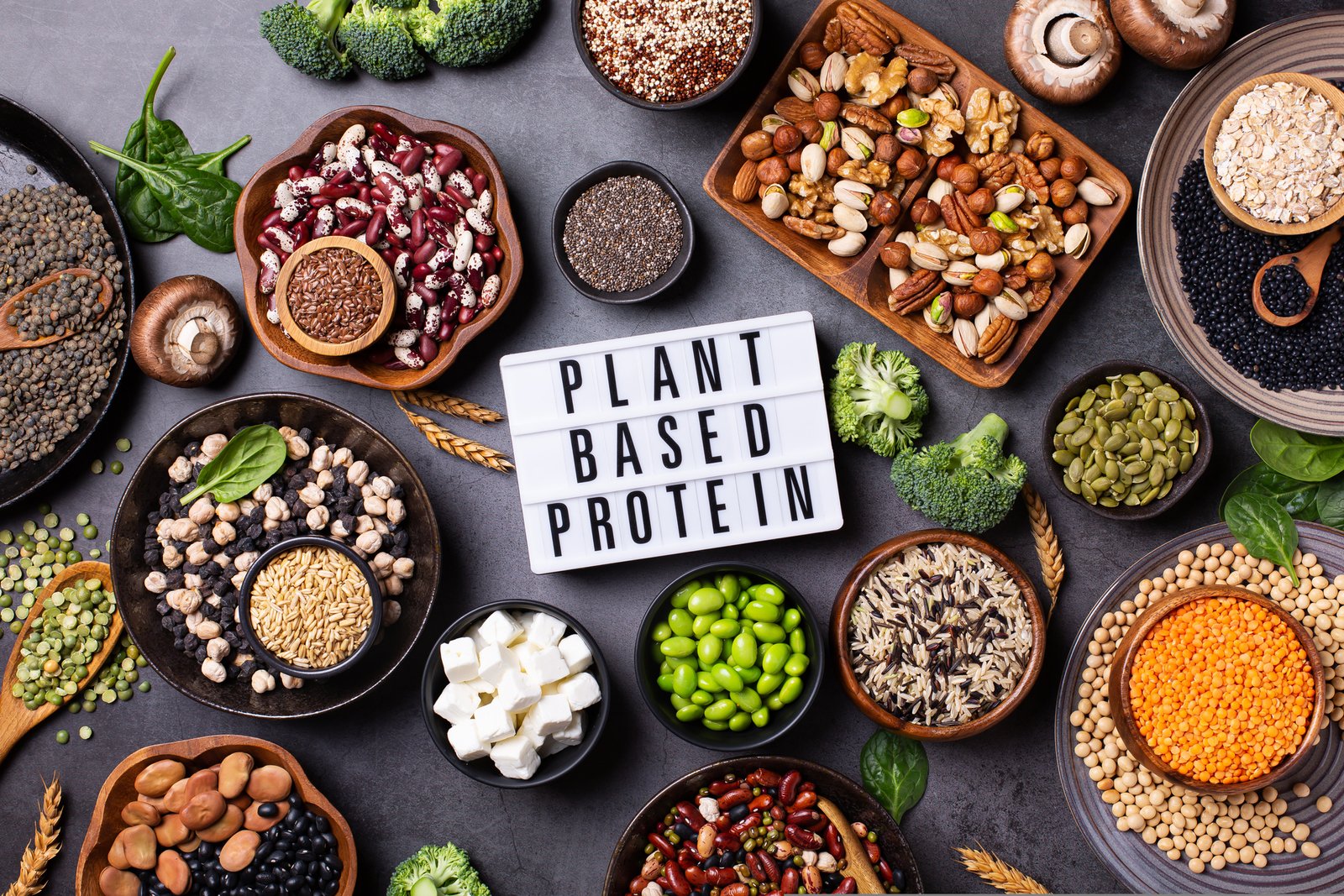Welcome to the energizing world of plant-based protein and economical living! In this post, we’ll set out on a journey investigating the ponders of plant-based protein. How it can benefit your well-being, and how to incorporate it into your meals and snacks.
Get prepared to find a wide assortment of tasty and nutritious plant-based protein sources. Debunk common myths, and learn from victory stories of people who have accomplished ideal sustenance with plant-based protein.
Join us as we explore challenges and impediments, celebrate the positive effect on the environment, and grasp the power of plant-based protein for a more beneficial and more joyful you!
The Wonders of Plant-Based Protein in Your Diet
Plant-based proteins represent a revolutionary change in sustainable living and nutrition. Not only does it provide all the amino acids your body needs, it also has many health benefits. Unlike animal protein, plant protein has no cholesterol, is low in saturated fat, and is good for heart health. Also rich in fiber, vitamins, minerals, and antioxidants, which help digestion, increase immunity, and promote health, plant-based is considerably the best choice one could make for healthy living.
Everyone’s life every ones living!
Total Protein Sources: Contrary to well known belief, plant-based proteins can give all the fundamental amino acids necessary for a sound diet. Foods such as quinoa, chia seeds, hemp seeds, and soybeans are considered total protein sources.
Improved Digestion: Plant-based proteins are for the most part simpler to process compared to creature proteins. They are regularly went with by dietary fiber, which helps in assimilation, advances intestine wellbeing, and makes a difference keep up a healthy weight.
Reduced Hazard of Unremitting Infections: Considers have appeared that plant-based diets wealthy in protein can offer assistance lower the chance of chronic illnesses, counting heart illness, diabetes, and certain sorts of cancer.
Plant-based proteins are typically lower in saturated fat and cholesterol, making them a more beneficial choice for long-term well-being.
Sustainable and Ecologically Friendly: Plant-based proteins have a lower environmental effect compared to animal-based proteins. Producing plant-based proteins requires fewer assets, such as water and arrive, and produces less nursery gas emissions, making it a more economical choice.
The wide variety of plant-based protein sources
One of the foremost energizing viewpoints of plant-based protein is the extraordinary assortment of sources available. From vegetables like lentils, chickpeas, and dark beans to entirety grains like quinoa and brown rice, the alternatives are endless. Nuts and seeds such as almonds, chia seeds, and hemp seeds are too fabulous sources of protein.
Additionally, soy products like tofu and tempeh, as well as plant-based protein powders, offer convenient and versatile options for meeting your protein needs.
Plant-based protein:
Legumes:
Lentils, chickpeas, dark beans, kidney beans, and edamame are all great sources of plant-based protein. They are also high in fiber, vitamins, and minerals. Quinoa: Quinoa could be a total protein, meaning it contains all nine basic amino acids. It’s moreover gluten-free and versatile, making it an awesome expansion to servings of mixed greens, stir-fries, or as a side dish.
Tofu and Tempeh:
Tofu and tempeh are made from soybeans and are wealthy in protein. They are too flexible fixings that can be utilized in different formulas, such as stir-fries, curries, or indeed as meat substitute in burgers or sandwiches.
Nuts and Seeds:
Almonds, walnuts, chia seeds, hemp seeds, and flaxseeds are all stuffed with protein and sound fats. They make awesome increases to smoothies, servings of mixed greens, or can be delighted in as a nibble on their claim.
Seitan:
Seitan is made from wheat gluten and may be a prevalent meat substitute for those taking after a plant-based diet. It features a meat-like surface and is a good source of protein.
Spirulina:
Spirulina may be a blue-green green growth that’s rich in protein and other nutrients. It can be added to smoothies, and juices, or utilized as a topping for a convenient and flexible alternative for meeting your protein needs.
Vary your protein sources to ensure you get a wide range of nutrients. It’s also a good idea to consult with a healthcare professional or registered dietitian to determine the right amount of protein for your specific dietary needs.

Exploring the benefits of Plant-Based protein
for your health and well-being
Incorporating plant-based protein into your diet can have a profound impact on your health and well-being. Research has shown that a plant-based diet can help reduce the risk of chronic diseases such as heart disease, diabetes, and certain types of cancer. Plant-based protein is also easier to digest, which can alleviate digestive issues and promote gut health. Also, plant-based protein is often lower in calories, making it an excellent choice for weight management and maintaining a healthy body weight.
How to Incorporate Plant-Based Protein into Your Meals and Snacks
Incorporating plant-based protein into your meals and snacks is easier than you might think. Start by adding legumes, such as beans or lentils, to soups, stews, and salads. Swap out animal-based proteins with plant-based alternatives like tofu or tempeh in stir-fries and sandwiches. Experiment with different grains like quinoa or amaranth to create protein-packed bowls or side dishes. Snack on nuts, seeds, or plant-based protein bars for a quick and satisfying energy boost. The conceivable outcomes are unending, and with a small inventiveness, you’ll appreciate tasty and nutritious plant-based protein in each meal.
Delicious and Nutritious Plant-Based Protein Recipes to Try.
To help you get started on your plant-based protein adventure, here are a few mouthwatering recipes to try:
Quinoa and Black Bean Salad: A refreshing and protein-packed salad with a zesty lime dressing.
Chickpea Curry: A super satisfying curry made with protein-rich chickpeas and aromatic spices.
Tofu Scramble: A delicious and vegan alternative to scrambled eggs, packed with plant-based protein and veggies.
Lentil Bolognese: A hearty and nutritious twist on the classic pasta dish, using protein-packed lentils instead of meat.
Debunking Common Myths about Plant-Based Protein
There are several misconceptions surrounding plant-based protein, but let’s debunk them once and for all. One myth commonly comes to mind, plant-based protein is incomplete and lacks essential amino acids. However, by combining different plant-based protein sources throughout the day, you can easily obtain all the essential amino acids your body needs. Another myth I could mention is that plant-based protein is not as bioavailable as animal-based protein. While it is true that some plant-based proteins may have lower bioavailability, a varied and balanced plant-based diet can provide more than enough protein for optimal health.
Tips for shopping for Plant-Based protein products
When shopping for plant-based protein rich produce, it’s essential to read labels and choose wisely. Look for products that are minimally processed and free from artificial additives or preservatives. Opt for organic and non-GMO options whenever possible to support sustainable farming practices. Additionally, consider the environmental impact of the packaging and choose products with eco-friendly packaging materials. Don’t forget to explore local farmers’ markets and bulk sections for fresh and affordable plant-based protein sources.
Sharing success stories of individuals who have achieved optimal nutrition with Plant-Based protein
Hearing success stories from people who have embraced plant-based protein can be unimaginably inspiring. From athletes who have moved forward their execution to people who have reversed persistent diseases, the control of plant-based protein is irrefutable.These stories serve as a reminder that plant-based protein is not only beneficial for our health but also for our overall well-being and quality of life. By nourishing our bodies with plant-based protein, we can achieve optimal nutrition and thrive in all aspects of life.
Navigating challenges and obstacles on your Plant-Based protein journey
While incorporating plant-based protein into your diet offers numerous benefits, it’s important to acknowledge that challenges and obstacles may arise. It can be challenging to find plant-based protein options when dining out or attending social events. However, with a little planning and preparation, you can navigate these situations successfully.
Research restaurants with plant-based options in advance, bring your own plant-based protein snacks to social gatherings, and be open to trying new recipes and flavors. Every step you take towards a plant-based protein lifestyle is a step towards a healthier and more sustainable future.
Experiment with Recipes: Explore new recipes and experiment with different plant-based protein sources. There are countless delicious and creative plant-based recipes available online or in cookbooks.
Educate Yourself: Take the time to learn about plant-based protein sources, their nutritional benefits, and how to incorporate them into your diet. Understanding the various options available will help you make informed choices and ensure you’re meeting your protein needs.
Seek Support: Connect with like-minded individuals who are also on a plant-based journey. Join online communities, forums, or local groups where you can share experiences, ask questions, and gain inspiration.
Be Mindful of Nutrient Balance: While plant-based protein sources offer a range of nutrients, it’s important to ensure you’re getting a variety of foods to meet your
Celebrating the positive impact of Plant-Based protein on the environment
Choosing plant-based protein is not only beneficial for our health but also for the environment. Animal agriculture is a significant contributor to greenhouse gas emissions, deforestation, and water pollution. By opting for plant-based protein, we can reduce our carbon footprint, conserve natural resources, and promote a more sustainable future.
Embracing plant-based protein is a powerful way to make a positive impact on the planet and contribute to a healthier and happier world for future generations.
Reduced Carbon Footprint:
Producing plant-based protein sources typically requires fewer resources and generates fewer greenhouse gas emissions compared to animal-based protein sources. Livestock agriculture is a significant contributor to deforestation, water pollution, and greenhouse gas emissions. Choosing plant-based protein can help reduce our carbon footprint and mitigate climate change.
Reduced Carbon Footprint:
Animal agriculture requires vast amounts of land and water resources. Producing plant-based protein requires significantly less land and water, allowing for more efficient use of these valuable resources. By shifting to plant-based protein, we can help conserve land, preserve biodiversity, and reduce water scarcity.
Preservation of Natural Habitats:
The expansion of animal agriculture often leads to the destruction of natural habitats, such as rainforests and grasslands, to make way for livestock farming or growing animal feed crops. By choosing plant-based protein, we can help protect and preserve these vital ecosystems, which are home to countless species of plants and animals.
In conclusion, the journey into the world of plant-based protein and sustainable living is an adventure worth embarking on. By incorporating plant-based protein into your diet, you can experience the wonders of improved health, increased vitality, and a positive impact on the environment. From exploring the wide variety of plant-based protein sources to trying delicious recipes and debunking common myths, there is so much to discover and enjoy. So, let’s embrace the power of plant-based protein and take a step towards a healthier and happier you!
Here is some plant based living motivational quotations:
“The greatness of a nation and its moral progress can be judged by the way its animals are treated.” – Mahatma Gandhi
“The choice to adopt a plant-based diet is both a practical and compassionate response to the world’s most pressing environmental issues.” – Jonathan Safran
“Nothing will benefit human health and increase the chances for survival of life on Earth as much as the evolution to a vegetarian diet.” – Albert Einstein
These quotes highlight the ethical, environmental, and health-related reasons for embracing a plant-based lifestyle. They encourage us to consider the impact of our choices on animals, the planet, and our own well-being.

Leave a Reply